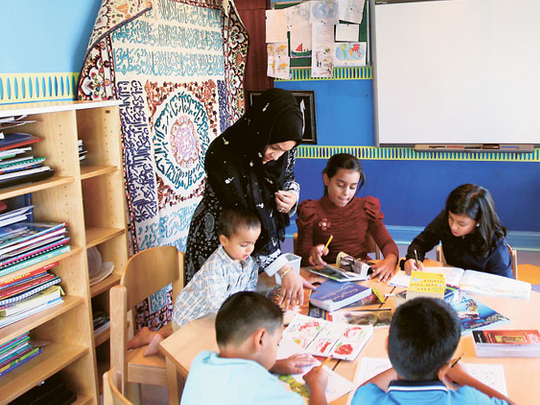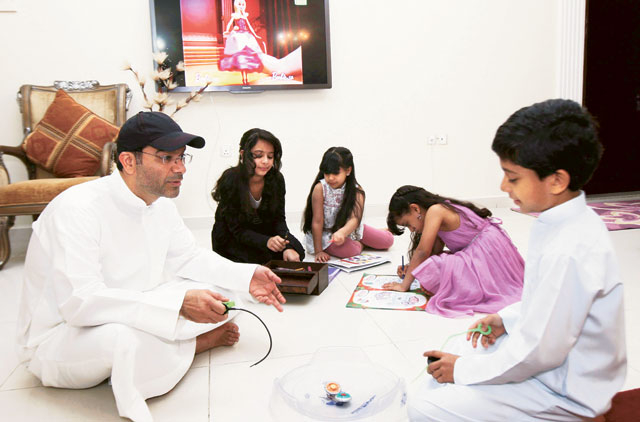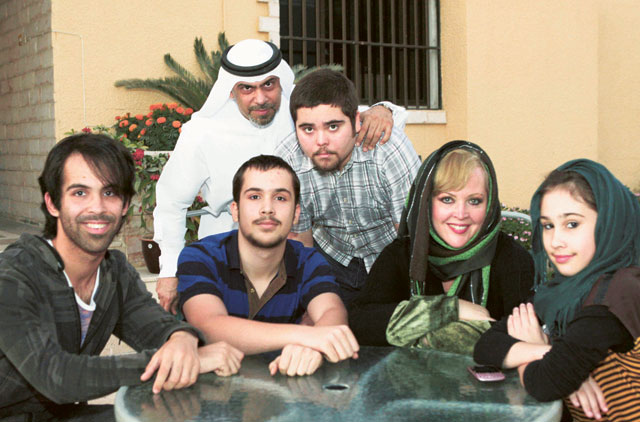
Despite the obvious benefit, a large brood in this day and age sounds daunting. Raising a large family means never having to feel alone. But the question that first springs to mind is how do parents with four, five or perhaps even more children actually manage?
"At all times it is like a festival at home. No problem seems big when the family is big," says Sara Jarwan, senior administration assistant with Emirates Airlines who is raising four children under the age of 11. "One great advantage of five kids is each has four other friends to keep them occupied 24/7," quips housewife and teacher Megan Faria, whose five daughters are aged between 15 and 31. "Birthdays and holidays are so much sweeter with several kids around to enjoy it," says Dedra Stevenson a published author, and founder and co-chairwoman of Women in Film and Television Dubai, also a mother of four.
"Most of my days start out being stressful because my four year old loves to cry in the morning while getting ready for school and then the 3-year-old is getting ready to eat and my 16-year-old gets upset because we are late getting to school with all the commotion going on," says housewife Claudia Mohammad whose oldest of four children is ready for college. Everyday chores multiply along with emotional legwork. Having several children literally translates to more heads of hair to comb, lunch boxes to pack and heaps of the "L" word home-makers hate. "Laundry is the most dreadful part" Jarwan says. "Putting them to bed is also a task," she continues "Kids always want to play with each other and then telling them a story which everyone understands at the same pace is another challenge."
New challenges
"Supporting each of them is a challenge when one has a match and the others want to go home to do homework," explains home-maker Salma Akhtar, who has four children between the ages of 17 and 6. As children grow older, parents swap one set of battles for another. "When they were all small it was physically challenging. Dressing, eating, playing, reading, bath time, it was tough juggling all their needs alone as my husband travels a lot," Akhtar continues. "As they have grown, the challenges are more emotional. It's all about pushing barriers and seeing how much they can get away with. It is certainly much more demanding."
While the best of days mean a satiating assortment of kisses and hugs, it takes one kid in the wrong place at the wrong time for things to tumble into total chaos. "One morning we were leaving for school and everything was in the car," Mohammad narrates, "then all of a sudden, my four-year-old started crying because he forgot his jacket."
"In our case, getting everyone in the car is a bit more challenging than most families have it," says Stevenson, whose 19-year-old son Ebrahim is autistic. "Sometimes our son refuses to get out of the car once we've arrived at our destination, so we must all gently try to coax him out. Outings are extremely challenging. He makes loud noises and runs away from us on occasion. And trust me, when people stare, it makes it even harder to take him in public. This could be why it's still very rare to see special-needs kids out with their families in the UAE." Stevenson feels blessed with the support she receives from her other children, "my sons are now old enough to help out with Ebrahim and this has been a godsend, since he's far too big and strong for me to handle."
In large families children start helping out as early as parents begin involving them. "We make sure when it is required of them to do chores, everyone chips in," says housewife Shahla Baig, who has chosen to home-school her five children, between 10 and one-and-a-half years of age. "We wanted the kids to have knowledge and language-focused education. In a public or private school environment there is one teaching method that is practised, whether it suits the kids or not," she adds.
With a daily timetable that weaves extracurricular activities along with academic instruction, Baig has the flexibility to instruct her 10-, 9- and 7-year-olds in certain subjects together. For languages and math, she has hired a tutor.
In an effort to find more time between parents and children, Baig has done away with the idiot box altogether. "Most home-schooling families avoid television sets in their houses. We don't want outside influence, plus this gives us more family time together." Instead they watch select films on a smart set. Baig and her husband have also devised a unique reward system to keep their children motivated to help around the house. "They can earn points by completing their chores and responsibilities. When they earn enough points they can use these to get privileges," she says. Cleaning the room is 50 points, teaching a little sibling is another 50, finishing food and taking the plate back gets a high score of 60. Children collect points over time and use it to buy privileges, such as a trip out or a game of bowling or tennis.
The test of discipline
But how does discipline work, I ask. Especially when gender and age of children differ? "As teenagers, I feel girls test you to the limit and boys, in my experience, are more accepting of rules. It can be a constant tug-of-war," Akhtar explains. "There is no difference for boys and girls when it comes to disciplining," Jarwan says, "yes, boys have to be taught that they have to take care of the younger ones and their sisters."
"If my teenagers need to be disciplined I punish them by taking their most valuable possession for example the phone, laptop or even grounding them. For the two smaller ones we may have them sit on the couch for a few minutes or talk to them in a firm voice," Mohammad explains. "Taking away a privilege may work for one, but be counterproductive for another," explains Stevenson's husband, Dr Hussain Maseeh, socialcare expert and Community Development Authority with Dubai Government. "One must get to know their children so that you can understand the individual personality types you're dealing with. Whether they are girls or boys, it's very important to give the children an adult that they can identify with."
Having a role model works effectively, as does laying down ground rules with the first child so younger ones can follow suit. This usually works beautifully if children are around the same age. But that's not been the case with Mohammad. A Colombian married to an Arab, she initially planned for two kids, then accepted her husband's desire for more and had another two. Mohammad's only wish now is that the age gap between the children was not so great. While the older two are almost out of school, the younger ones are in kindergarten. "It's like starting full circle again!" she exclaims.
American by birth and now an Emirati, Stevenson (she converted to Islam well before marrying a Muslim) always dreamt of having a large family. "I actually always wanted a lot of children as I came from a small family and was envious of families which were large. I love the thought of lots of grandkids. I really dream of one day in the future when we will celebrate with grandchildren, sitting around a big table or being able to go on a big family trip to Disney World."
With many offspring there are several perks, even if you're the only man in a home with six women. "I enjoy different relationships with each daughter but have never felt intimidated by all the women!" says businessman Cyril Faria who is married to Megan.
"Each child supports me in a different way, whether it is in my business, philanthropy or mutual interests."
Children support parents and extended family also plays an intrinsic role in lending a helping hand. "When the work gets really busy, I do not have to worry about cooking as the food is prepared in my mother-in-law's house and sent across. If the domestic help falls ill either my sisters or my friends come over to help me," Jarwan says. "Grandparents are a big help, we usually meet up on weekends and eat together," Baig adds. Stevenson's experience differs. "I feel the ‘good neighbour' feeling in our community is dead, we get a lot of emotional support. People are always ready to give you a pat on the back and say supportive things, but in the run of things, we still feel very ‘on our own' unfortunately."
Like finances the everyday polyphony within a family is ultimately prime responsibility of man and wife. A supportive partner is essential for harmony. "Everything including the household chores and the home work is my responsibility. Then after 6pm my husband takes over the task of going through their daily school events and entertaining them besides taking us out for a drive," Jarwan says. "Hussain pitches in when I need a break," Stevenson informs. "A supportive partner is the most important," Faria sums up. "It's not easy and it's not common these days to have a big family but when we look around now at our kids and grandkids, neither of us would have our family any other way!"
First-hand advice for parents interested in having a large family
- Recycle toys, play gyms, clothes, bicycles and books. This helps save a lot of money. So keep things in good condition.
— Shahla Baig
- Plan finances and invest in insurance as well as an educational plan.
— Sara Jarwan
- Buy all non-perishable items in bulk to save on overall cost.
— Dedra Stevenson
- Have a budget and live within your means. Teach children to be sensible with money and save for a rainy day.
— Salma Akhtar
- Have medical insurance and a savings account for the children so there's no struggle when kids are ready for college.
— Claudia Mohammad
- Both spouses should agree on how to manage expenses.
— Megan Faria
Home-Schooling tips
- "Choose a curriculum that fits your child's learning style and your learning goals," Shahla Baig says. She and her husband chose the Classical Model. They recommend the book The Well Trained Mind, which gives step-by-step instructions on how to give the child an academically rigorous, comprehensive education from preschool through high school.
- Many families in the US, UK, New Zealand and Australia are opting to home-school their kids.
- Dubai has the K12 Academy which is located in Knowledge Village.
— Shahana Raza is a UAE-based freelance writer













